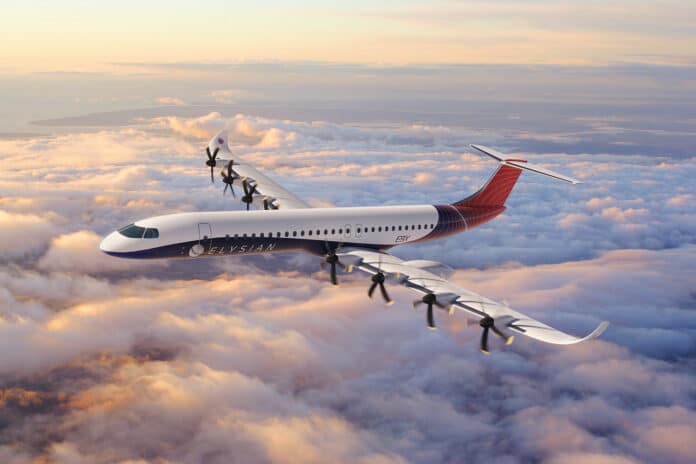At the global aviation conference AIAA SciTech Forum, aerospace startup Elysian and Delft University of Technology demonstrated the viability of battery-electric air travel on a larger scale than previously thought possible. Their revised calculations, based on new design principles, signal a paradigm shift in the potential of battery-electric flight. Their revised calculations, based on new design principles, signal a paradigm shift in the potential of battery-electric flight.
Traditionally, battery-electric flying was not considered a mainstream aviation solution, given assumed aircraft capacity and range limitations. However, this perception is being challenged by two scientific papers.
The first paper takes a fresh look at assumptions that have led to the belief that battery-electric aircraft have limited applicability. It presents new parametric designs for a feasible battery-electric aircraft that can carry 40-120 passengers and fly up to 1000 km cruise range. The second paper outlines the design of a 90-passenger battery-electric aircraft that can travel up to 800 km on battery power alone, assuming a battery pack energy density of 360 Wh/kg.
The researchers have come up with a 90-passenger, battery-electric aircraft that can travel 800 km with a pack energy density of 360 Wh/kg. Elysian has been established to continue developing this aircraft, aiming to become operational by 2033.
The design of the Elysian E9X takes inspiration from the first-generation narrow-body aircraft of the 1960s. The company believes that the aircraft’s small fuselage and longer wings, which house most of the battery mass and the rear landing gear, can save a lot of airframe mass and reduce drag by around 15% for a corresponding range boost.
Batteries are more energy-efficient than hydrogen in any of its forms, according to recent findings. The company claims that battery-electric airliners can travel up to five times further per unit of energy than hydrogen or SAF-powered aircraft. As the world moves towards renewable energy, this could be an important factor to consider.
Elysian is the startup that has received $10 million in backing from Panta Holdings to develop the E9X airliner. However, the company will need to secure billions of dollars to design, prototype, test, certify, and manufacture the aircraft, which has a 90-seat capacity. It would not be a cheap retrofit that can be easily added to a second-hand airplane purchased for a few million dollars.
“We expect Elysian to make a significant contribution to discovering the boundaries of battery electric flying by taking a refreshingly new look at the combination of technology and design. We wholeheartedly support their systematic and scientific approach and look forward to their solutions to the technological challenges ahead,” said Joris Melkert, Senior Lecturer of Aerospace Engineering at Delft University of Technology.
